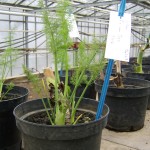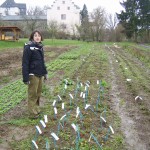Bingenheimer’s resident plant breeder, Ute Kirchgaesser, is on to something. Really, she’s probably on to many things, but to describe them all would take a book and I only have one blog posting.
Ute has what equates to a master’s degree in horticulture, but her German title sounds much better; Meistergartnerin. She got her start in plant breeding with a family run seed company where she learned the basics of traditional plant breeding, and has combined that knowledge with a more esoteric knowledge of an anthroposophical kind. All of these experiences combine to make her something more like and Ubermeistergarternerin if you ask me. But if you ask her, she is just a vegetable breeder.
Ute is working on developing a summer fennel. She is in the process of improving some leek varieties, and also is working to re-invigorate some old kales. She is in charge of the on-site seed production for Bingenheimer’s catalog. And she is also working on a project that even she can’t explain.
In 2002, she began to study what effect musical intervals have on plants. Previous studies have been done that show that plants respond well to classical music, and not so well to death metal. Ute wanted to know if a particular sequence of notes effects plants more than another, and she wanted to know if this effect can be seen in subsequent generations. She set up a research project working with some lettuces, which she surmised would show results quickly due to their rapid growth.























